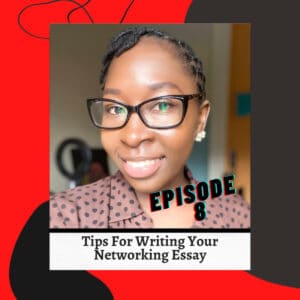It is not difficult to get the Chevening Scholarship. It is a very prestigious scholarship that attracts numerous candidates globally which makes it very competitive. But it is not a hard award to win. It is doable with the correct mindset, thorough research and preparation, for you to succeed in winning the scholarship.
I was awarded the 2018/2019 Chevening Scholarship on my first application attempt. So it is possible!
There are candidates who are selected for the scholarship after the second or third attempt but that should not be a testament to the unattainability of the scholarship. There are very many people out there who get in on the first try!
Many people think that winning scholarships is just for the few but that is far from the truth! If you already begin with a failure mindset, that is what you will attract to yourself.
So, I did a bit of research by looking into the Chevening Scholarship website in-depth, analysed some of the Chevening Scholarship forums on Facebook and talked to some scholars to identify the common reasons why some of you may not be succeeding at the application process.
I have compiled a list of 11 reasons which makes it difficult for prospective applicants from winning the Chevening Schoalrship:
The Chevening Scholarship website states 6 main eligibility requirements that every prospective applicant should meet to qualify for the scholarship.
- Be a citizen of a Chevening-eligible country or territory.
- Return to your country of citizenship for a minimum of two years after your award has ended.
- Have completed all components of an undergraduate degree that will enable you to gain entry onto a postgraduate programme at a UK university by the time you submit your application. This is typically equivalent to an upper second-class 2:1 honours degree in the UK.
- Have at least two years of work experience.
- Apply to three different eligible UK university courses and have received an unconditional offer from one of these choices by the stipulated deadline
- Meet the Chevening English language requirement by the stipulated deadline
It boldly spells out that “ineligible applications will be rejected” so ensure that you first check if you meet these baseline requirements before you even start your application.
This will save you time and heartbreak as the application system electronically sifts you against the eligibility criteria and automatically removes you from the selection process if you do not qualify.
You should also stay away from these common errors as it is not possible to make changes to your application once it has been submitted.
Kimola’s Tip: Read the website thoroughly and understand it. The information there is invaluable and will help you bypass common mistakes.
2. Poorly written essays
There are 4 major essays that form part of the application process and the Chevening Scholarship heavily relies on them to shortlist candidates for the global interviews.
Your essays need to be written in ENGLISH and are analysed by a reading committee (humans) who go through your essays.
Please ensure that your essays captivate and clearly state why you want to study in the UK, why your chosen course matters and bring out your leadership and networking skills coupled with an audacious career plan demonstrates you have a clear direction of where you want to be.
For the career plan essay, break it down into three parts: your immediate, midterm and long term plans.
Also check out the DFID website and incorporate the UK’s priority areas for your home country. I talk about how to do that here.
3. Short essays
If your essays are shorter than the word limit, the system automatically disqualifies you.
The essays have a minimum word count of 100 words and a maximum of 500 words.
Please strive to ensure you meet these requirements because the website clearly states that “answers that are less than 100 words will not be considered”.
4.Plagiarism
As you already know the application relies heavily on written word and all the applications are run through plagiarism software.
Those found to have committed plagiarism, will be disqualified.
Your essays can borrow from online sources but reference/acknowledge the authors or insert quotations just like in an academic essay.
5. Not demonstrating that you can undertake an intense master’s course in the UK
The website states that your essays and interviews need to demonstrate that you have the ability to complete a masters programme.
You can allude you are capabe of this through either through your past work experience, leadership roles you’ve held and career plan.
6. Not separating yourself from the rest
The scholarship is competitive and attracts very strong candidates.
You may have been great but this is life, there will always be someone greater than you and maybe this time, they were picked.
This should not make you feel less than. Next time separate yourself from the rest by writting compelling essays and demonstrating that you befitting of the scholarship by highlighting unique things you have or will do.
If you are keen on the scholarship, you can always apply again in the next round.
7. Lack of funding from the scholarship at the time
The scholarship is funded by the Foreign and Commonwealth office and allocates funds for a set number of scholars per year.
You may have had everything going for you but there are no funds to be allocated to you.
Sometimes you can be selected but put in the reserves list and when someone drops out or more funding is allocated, you will be selected for the award (that happened to a friend in my 2018/2019 cohort).
8. Missing crucial deadlines
The Chevening Scholarship has a clear application timeline for submitting references, documents, unconditional university offers etc.
If you miss the deadlines, you miss the scholarships.
9. Not getting unconditional offers from universities
For your Chevening Scholarship to be finalised, the Secretariat needs to see evidence of an unconditional offer from one of your three course choices.
The only exception is if you get a conditional offer that only needs you to fulfill a financial condition (i.e. to pay a deposit for the course).
So ensure that you secure an unconditional offer before the deadline.
10. UK did not have priority areas in your home country
If you have noticed there are some countries that have higher numbers of Chevening scholars than the rest and this is because the UK has some priority areas that are of interest in those countries.
In Africa for example, a large number of scholars come from Nigeria and Egypt and other countries have fewer scholars picked either due to low number of applications or the UK not having many priority areas in the home country to warrant a large number of scholars.
11. Failing mandatory tests
Qualifying scholars who are required to take a TB tests (for visa purposes) and English test and do not pass are automatically disqualified. Visa denial also fall into this category.
I hope these 11 reasons have given you insight into the common mistakes that you can avoid so that you can secure a Chevening Scholarship the next time you apply. It is not hard nor difficult to land the award with thorough preparation.
If you have any questions, please comment below.
#ConnectwithKimola
Latest posts by Cynthia Kimola (see all)
- WHY YOU NEED TO BE CHECKING THE CHEVENING SCHOLARSHIP WEBSITE REGULARLY! - September 27, 2020
- Picking Your References – Mistakes To Avoid On The Chevening Scholarship - September 14, 2020
- Include These Fun Reasons In The ‘ Why Do You Want To Study In The UK’ Chevening Essay - September 14, 2020


